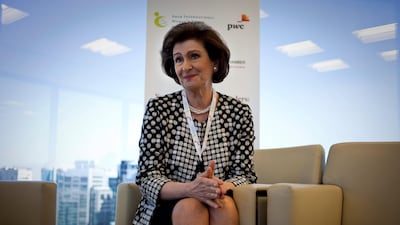For over 20 years, London resident Haifa Al Kaylani sought to empower women in Arab countries by connecting them to institutions in the UK and across the world.
“The Arab world is part and parcel of the international community, we’re not an island by ourselves,” she told The National.
The Arab International Women’s Forum, which she founded in London in 2001 and still heads, supports women and young people in setting up businesses and developing their skills.
“I wanted to build those bridges between women in the Arab region together, but also between their counterparts in the UK, and globally,” she said.
For this, she was appointed an Officer of the Most Excellent Order of the British Empire in King Charles’ New Year 2024 Honours List.
The award is in recognition of her services to Women, Young People and Cultural Relations between the UK and the countries of the Middle East. “I’m truly thrilled and equally grateful and humbled,” she said, speaking to The National from her second home in Abu Dhabi.
Mrs Al Kaylani was born into a Palestinian-Lebanese family and went to school in the UK, later studying at Oxford University. “In all my work, I am addressing the subject as an economist, not as a feminist,” she said.
“I am a development economist, and for me, without empowering 50 per cent of its population no country can develop politically, socially, or economically,” she said.
She was motivated to set up the AIWF, in part, by negative stereotypes of Arab women in the UK at the time. “There was a lot of misunderstanding about the role of women in the region,” she recalled.
She had encountered these stereotypes while serving as the President of the International Federation of Women’s Associations in London. People were surprised to see an Arab and Muslim woman at the helm of the organisation. “I would be asked: you’re an Arab? You’re a Muslim?” she recalled.

Since then, the AIWF has evolved into to support women, young people and sustainability. Among her early projects was helping women in Arab countries to set up businesses. “It was important to think of women as engines of growth,” she said.
The Arab uprisings in 2011 further inspired her to set up an initiative for young Arab women leaders. “The youth were educated but they were not able to find jobs. They were not fully utilised,” she said.
Focusing on women aged 20 to 40 years old, the AIWF held conferences across major Middle Eastern capitals including Abu Dhabi and internationally. “This was in order to discuss what is stopping them from optimising that potential,” she said.
The AIWF has focused on women’s role in addressing climate change and sustainability joining forces with Masdar’s Women in Sustainability, Environment and Renewable Energy platform (WiSER) to produce a report ahead of COP28.
Mrs Al Kaylani gave four addresses at the climate change conference in December, including moderating a panel at the Arab Women Leader’s Summit.
“Women have to be at the table. Their voices must be heard,” she said.
Her understanding of the culture in Arab countries helped her navigate the challenging terrain with ease, she said.
“I come from the region. I am an Arab, very proudly with three roots, and a UK citizen. I understand our culture, I was brought up in our region with the appreciation for our heritage,” she said.
“When I address issues about the empowerment, I am saying we must support women’s roles as partners, at home, in society, in government, in the business sector,” she said.
Mrs Al Kaylani will meet King Charles III at her investiture, the ceremony at one of the royal residences in which she will receive her award.
Yet this will not be for the first time. She first met the King in 1975, when he was then the Prince of Wales, at the coronation of Nepalese King Birendra.
Her husband, the Jordanian diplomat Wajih Al Kaylani, was serving as Ambassador to India, Nepal and Sri Lanka at the time, and headed Jordan’s delegation for the event.
She met King Charles a second time at the 50th anniversary of the Philharmonia Orchestra when she was on a committee supporting the celebrations.
After her investiture, she hopes to have lunch with her son and his wife at the couple’s London home.
She paid tribute to her late husband, whom she says was her greatest supporter. “The AIWF took a lot of my time over the years, and a lot of my family time. Without my husband’s support and encouragement, I could not have done it,” she said.
Yet she feared the challenges that the Israel-Gaza war would bring to the region. “Our region has been plagued over the years by conflict. It’s women and children who suffer the most. We have seen that with our own eyes,” she said.
“It’s very important that we try to foster peace. Without peace there cannot be growth, there cannot be prosperity, people cannot work, cannot build a better future for their families. And of course, women’s empowerment also suffers,” she added.
“The most important thing we need to work on is working for peace,” she said.


